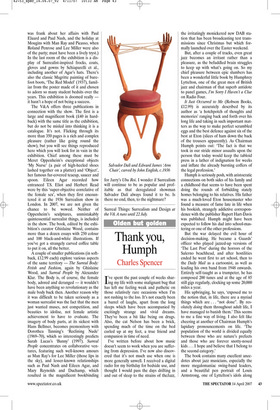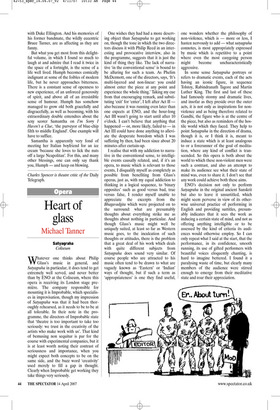Thank you, Humph
Charles Spencer
I’ve spent the past couple of weeks sharing my life with some malignant bug that has left me feeling weak and pathetic on those relatively rare occasions when I’m not rushing to the loo. It’s not exactly been a barrel of laughs, apart from the long sleeps which have been accompanied by excitingly strange and vivid dreams. They’ve been a bit like being on drugs. Also, the cat Nelson has been a brick, spending much of the time on the bed curled up at my feet, a true friend and companion in time of need.
I’ve written before about how music doesn’t seem to work when you are suffering from depression. I’ve now also discovered that it’s not much use when one is more generally unwell. I received a digital radio for my birthday for bedside use, and thought I would pass the days drifting in and out of sleep to the strains of theJazz, the irritatingly monickered new DAB station that has been broadcasting test transmissions since Christmas but which formally launched over the Easter weekend.
But, after a couple of tracks, even great jazz becomes an irritant rather than a pleasure, as the befuddled brain struggles to keep up with what’s going on. So my chief pleasure between epic slumbers has been a wonderful little book by Humphrey Lyttelton, one of the great men of British jazz and chairman of that superb antidote to panel games, I’m Sorry I Haven’t a Clue on Radio Four.
It Just Occurred to Me (Robson Books, £12.99) is accurately described by its author as ‘a hotchpotch of thoughts and memories’ ranging back and forth over his long life and taking in such important matters as the way to make perfect scrambled eggs and the best defence against six of the best at Eton (slices of ham down the back of the trousers apparently). As Chairman Humph points out: ‘The fact is that we took in our stride minor assaults upon the person that today would keep the tabloid press in a lather of indignation for weeks and inflate the already bursting coffers of the legal profession.’ Humph is seriously posh, with aristocratic connections on both sides of his family and a childhood that seems to have been spent doing the rounds of forbidding stately homes belonging to his relatives. His father was a much-loved Eton housemaster who found a measure of fame late in life when his bookish, strangely addictive correspondence with the publisher Rupert Hart-Davis was published. Humph might have been expected to follow his dad into school-mastering or one of the other professions.
But the war delayed the evil hour of decision-making. He became a Guards’ officer who played jazzed-up versions of ‘The Last Post’ during the horrors of the Salerno beachhead, and after hostilities ended he went first to art school, then to the Daily Mail as a cartoonist, as well as leading his own band from 1948 onwards. Entirely self-taught as a trumpeter, he has composed 200 tunes and at the age of 85 still gigs regularly, clocking up some 20,000 miles a year.
His upbringing, he says, ‘exposed me to the notion that, in life, there are a myriad things which are ... “not done”. By resolutely doing them throughout adult life, I have managed to banish them.’ This seems to me a fine way of living. I also felt like cheering at another of Chairman Humph’s lapidary pronouncements on life. ‘The population of the world is divided equally between those who are nature’s prefects and those who are forever snotty-nosed kids ... I hope and believe that I belong to the second category.’ The book contains many excellent anecdotes about jazz musicians, especially the more megalomaniac swing-band leaders, and a beautiful pen portrait of Louis Armstrong, one of Lyttelton’s idols along with Duke Ellington. And his memories of his former bandmate, the wildly eccentric Bruce Turner, are as affecting as they are funny.
But what you get most from this delightful volume, in which I found so much to laugh at and admire that I read it twice in the space of a fortnight, is the sense of a life well lived. Humph becomes comically indignant at some of the foibles of modern life, but he never approaches bitterness. There is a constant sense of openness to new experience, of an unforced generosity of spirit, and above all of an irresistible sense of humour. Humph has somehow managed to grow old both gracefully and disgracefully, as well as becoming, with his extraordinary double entendres about the sexy scorer Samantha on I’m Sorry I Haven’t a Clue, ‘the purveyor of blue-chip filth to middle England’. One example will have to suffice.
Samantha is apparently very fond of meeting her Italian boyfriend for an ice cream ‘because she loves to lick the nuts off a large Neapolitan’. For this, and many other blessings, one can only say thank you, Humph — and keep on blowing.



































































 Previous page
Previous page